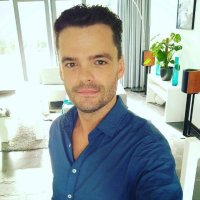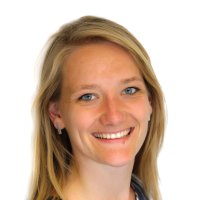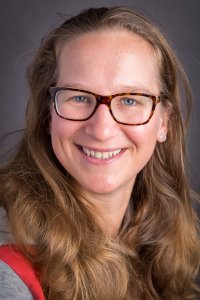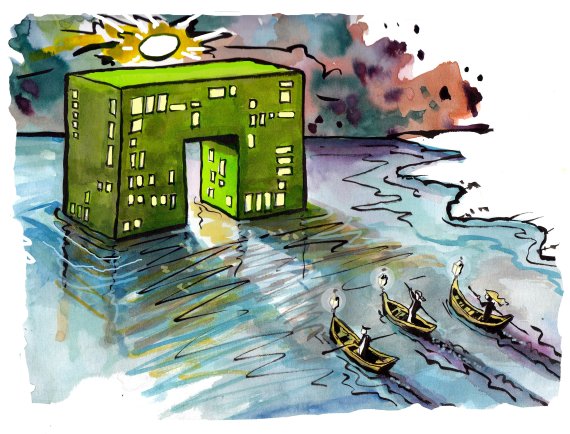Illustration Henk van Ruitenbeek

Marion KempermanCommunication specialist at Education and Student Affairs
‘What I like about working at WUR is the freedom I get. For example, I can organize my time myself and bring in new ideas. I am proud of my work, but I’m insecure too because after nearly six years I still don’t have a permanent contract, and this contract can only be extended one more time through the agency. There is talk of a permanent contract, but no action yet. I don’t feel as though I am 100 percent WUR, even though I do put 100 percent into my work. Over the years I’ve learned a lot and built up a considerable network, and I would have thought it would be a pity for the organization to lose that. Also, it is not easy to find information about career development within WUR. That should be offered more actively, if you ask me. Because if you want to hold on to talented young people, you have to offer them clear prospects.’

Karin SchroenPersonal professor of Food Process Engineering
‘Young talent makes me think of tenure trackers. An awful lot is expected of these young people. They have to design and teach courses, write project proposals and do research. That way you create a lot of tension, and we should be aware of that. We certainly don’t have to hold their hands, but it is important that they have a contact person and coaching, for instance, so people don’t get overwhelmed from the start. Now it is up to the chair groups to arrange that sort of thing, but perhaps WUR should take more responsibility for it, by establishing clear guidelines, for example. Extra funding for PhD positions would help too, giving tenure trackers a less hectic start.’

Sander van de GeijnICT manager, Facilities & Services
‘WUR is an unusually supportive employer, and treats its personnel well. Before I came here I worked for a large commercial organization, where I just felt like a number. I’ve already been working here for seven years now, but I am still one of the youngsters in my department. They are working on attracting younger people, through a training programme and by taking on interns, so a start has been made. When I had just begun, it was hard to find my way at times. I did get to know my immediate colleagues but there was no induction programme for getting to know the organization better. That kind of programme could have helped me. Now I’ve found my feet and, partly thanks to YoungWUR, I have expanded my network and got to know a lot of people my age.

Simone RitzerCommunication specialist at University Fund Wageningen
‘I’ve been working at WUR for a year now. What I like is that I get a lot of space to grow. But then I do have to figure out for myself what I want and how I can achieve it. To attract young talent it is important to communicate clearly about the career prospects and to show that you can do a lot more here than research alone. At present a lot of people feel – incorrectly – that WUR doesn’t provide many opportunities for growth. It would be good to offer more traineeships and talent programmes, for instance, because we have enough in-house expertise among our experienced staff. I think WUR could make clearer how a talented young person can grow in the organization, which steps you need to take to do that, and what guidance is available.’

Marin van RegterenResearcher at Wageningen Marine Research
‘I’ve been doing PhD research in Den Helder for three years. I would love to get together with other PhD candidates to get some fresh insights and to hear about how they solve their problems. There are only a few other PhD candidates at this institute, and they are working in a completely different field. That means you learn a lot about other subjects, but sometimes you miss discussions about your own professional field. To me, one down side is that colleagues don’t always have much time if you want to consult them about research. I often get asked: do you have hours for that? That’s because they have to log billable hours. It would be better for the atmosphere and cooperation if they could be a bit more flexible. I will finish my PhD next year. A colleague of mine graduated a year ago and now has a job that combines 50 percent postdoc research with 50 percent institute research. I think that would be great.’

Jose Gonzales RojasResearcher at Wageningen Bioveterinary Research
‘I think Wageningen Research should establish a tenure track, just like the university, so talented young researchers can develop there
. You could have a ‘research track’ or a ‘project leader track’, requiring participants to improve their performance constantly. You’ve got to challenge young talent. I come from Bolivia and I’ve been working at this institute since 2015. I was very pleased that I got a three-year contract straightaway, rather than a one-year one. That provides some peace of mind and stability. I’ve had a lot of support in the past few years and one month ago I got a permanent contract. This year I started a personal leadership training. Up to now I’ve had good opportunities to develop, but I hope to see a career path for all young staff.’

